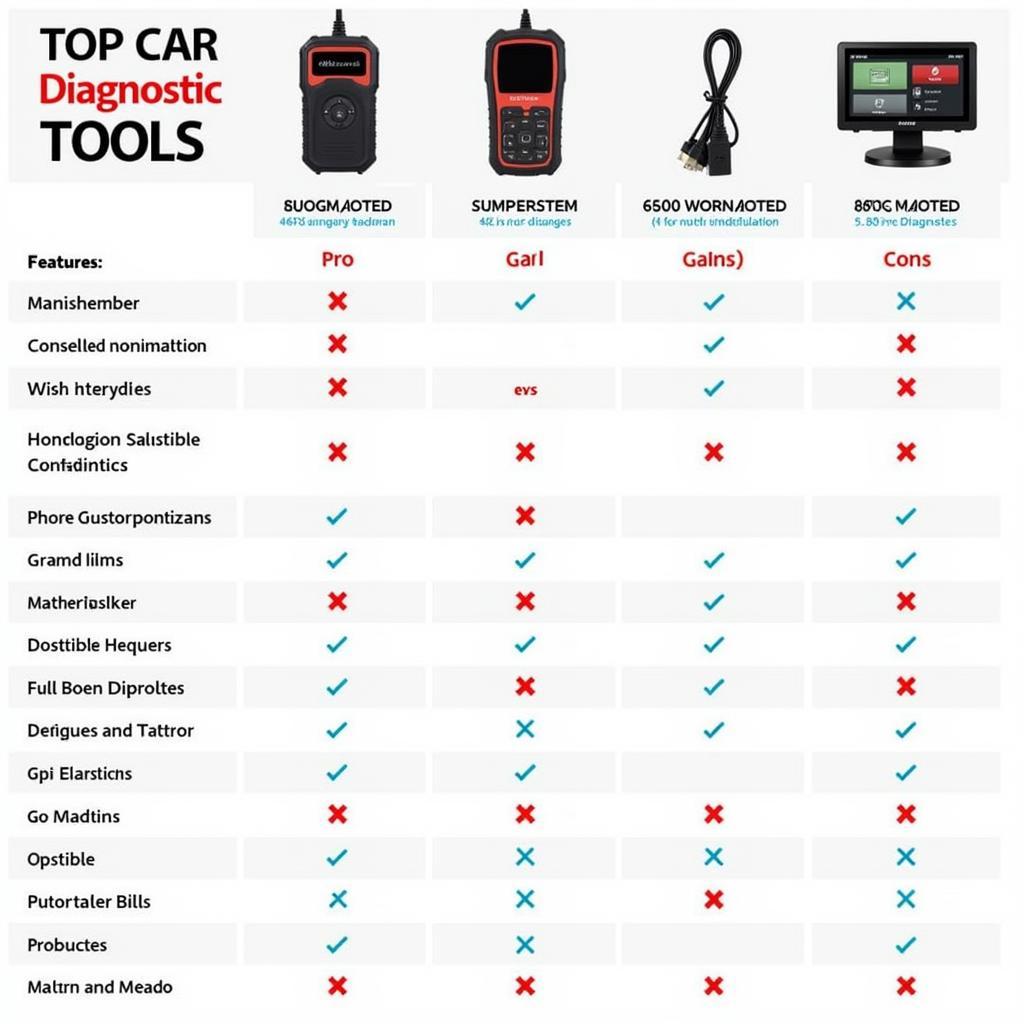Finding the best car diagnostic tool can feel like navigating a maze, especially with so many options flooding the market. Whether you’re a seasoned mechanic or a car enthusiast looking to troubleshoot your own vehicle, you need a reliable tool that provides accurate information and helps you get the job done right. This comprehensive guide will delve into the world of car diagnostics, providing you with everything you need to know to make an informed decision and choose the perfect tool for your needs.
 Best Car Diagnostic Tools Comparison Chart
Best Car Diagnostic Tools Comparison Chart
What are Car Diagnostic Tools and Why are They Essential?
Car diagnostic tools are sophisticated devices that act as a window into your vehicle’s computer system. They connect to your car’s OBD-II port, usually located under the dashboard on the driver’s side, and retrieve diagnostic trouble codes (DTCs), real-time data, and other crucial information.
These tools empower you to:
- Identify the root cause of warning lights: Say goodbye to the frustration of a blinking check engine light with no clue about its meaning. Diagnostic tools decipher these codes, revealing the underlying issue.
- Read and clear DTCs: From engine misfires to emissions issues, these tools pinpoint the problem area, allowing you to address it promptly.
- Monitor live data streams: Observe real-time parameters like engine speed, coolant temperature, and oxygen sensor readings to gain valuable insights into your car’s performance.
- Perform advanced functions: Depending on the tool, you can access functionalities like ABS bleeding, airbag system resets, and key programming.
Types of Car Diagnostic Tools
Navigating the world of car diagnostics requires understanding the different types of tools available:
1. Basic Code Readers:
- Ideal for: Car owners and DIY enthusiasts who need to read and clear basic DTCs.
- Pros: Affordable, user-friendly, and portable.
- Cons: Limited functionality, may not provide in-depth data or advanced features.
2. OBD-II Scanners:
- Ideal for: Car owners, DIYers, and mechanics who need more advanced functionalities than basic code readers.
- Pros: Read and clear DTCs, display live data, and offer additional features like freeze frame data and emissions readiness checks.
- Cons: May not cover all vehicle systems or offer manufacturer-specific functionalities.
3. Professional-Grade Scan Tools:
- Ideal for: Professional mechanics and experienced DIYers who demand comprehensive diagnostics and advanced features.
- Pros: Cover a wide range of vehicle systems, provide in-depth data analysis, and offer manufacturer-specific functionalities like bi-directional control and programming.
- Cons: Expensive, require technical expertise, and may have a steeper learning curve.
Choosing the Right Tool for Your Needs
Consider these factors when making your decision:
1. Your Skill Level and Intended Use:
- DIY Enthusiast: A basic code reader or an OBD-II scanner might suffice for reading and clearing codes, and monitoring basic parameters.
- Professional Mechanic: A professional-grade scan tool is crucial for comprehensive diagnostics, advanced functionalities, and manufacturer-specific capabilities.
2. Vehicle Compatibility:
- Ensure the tool supports your car’s make, model, and year. Some tools specialize in specific manufacturers, while others offer wider compatibility.
3. Features and Functionality:
- Determine the essential features for your needs. Do you require live data streaming? Bi-directional control? ABS bleeding? Prioritize tools that align with your requirements.
4. Budget:
- Car diagnostic tools range from affordable to expensive. Set a budget beforehand and explore options within your price range.
5. User Interface and Ease of Use:
- Opt for a tool with a user-friendly interface, clear navigation, and intuitive controls. Consider factors like screen size, button layout, and menu structure.
 Features and Functions of Car Diagnostic Tools
Features and Functions of Car Diagnostic Tools
Expert Insights on Car Diagnostic Tools
“Investing in a quality car diagnostic tool is essential for any serious car owner or mechanic,” says John Smith, a seasoned automotive technician with over 20 years of experience. “It empowers you to take control of your vehicle’s health, troubleshoot issues effectively, and save money on unnecessary repairs in the long run.”
Smith emphasizes the importance of choosing a tool from a reputable brand that offers regular software updates to ensure compatibility with the latest vehicle models and diagnostic protocols. He also recommends looking for tools with excellent customer support and resources to assist users with any technical challenges.
Conclusion
Choosing the best car diagnostic tool for your needs is crucial for maintaining your vehicle’s health, diagnosing issues accurately, and making informed repair decisions. By considering your skill level, vehicle compatibility, desired features, budget, and user-friendliness, you can confidently select a tool that empowers you to tackle any automotive challenge.
Remember, investing in a reliable car diagnostic tool is an investment in your peace of mind and your vehicle’s longevity.

Leave a Reply